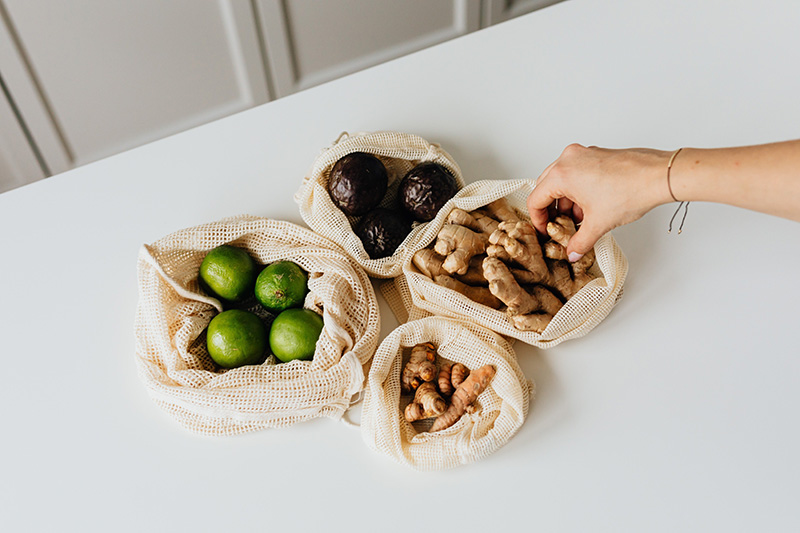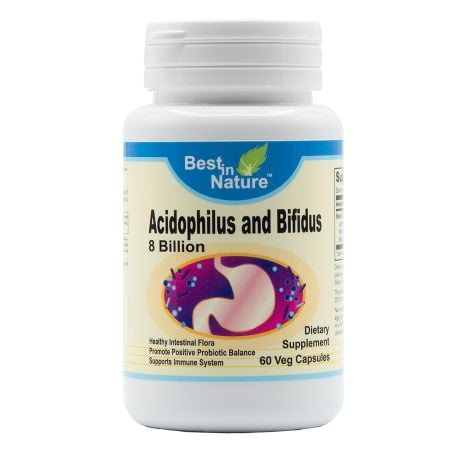
10 min read
You may have tried everything on the market, from herbal teas to restricted ingredients and specific exercises, yet the hard air bubble in your stomach still won’t go away.
For both men and women, bloating can be an aggravating and stubborn daily occurrence. Often, many people are unsuccessful at treating their bloat because they haven’t been able to identify what’s causing it.
The cause of your bloating might just be some of the things you least suspect. Let's discuss some root causes of bloating as well as 26 foods that may help to ease the bloat.
Related: The Benefits of Calisthenics and How to Get Started
What causes bloating?
Around 15% of the population in the United States experiences bloating or distention monthly which is when air or food is stuck in the digestive tract.
Doctors have found several different factors that can contribute to bloating including the following:
- Swallowing too much air
- Excess gas from specific foods
- Small intestine bacterial overgrowth (SIBO)
- Constipation
- Fluid retention
- Food intolerances
- Stress
- Irritable bowel syndrome (IBS)
- Eating disorders
- Gynecological conditions (like endometriosis)
- Infections (like norovirus or rotavirus)
Similarly, some experts advise incorporating foods higher in potassium and water because a lack of potassium results in the body holding sodium and water, which can also cause bloating.
If you’re looking to prioritize your health and control your bloating, check out Best in Nature and their all-natural supplements!
FODMAP foods may increase bloating

For those that haven’t heard the term before, FODMAP refers to high-fiber foods containing fermentable oligosaccharides, disaccharides, monosaccharides, and polyols.
That was a lot of long words, but essentially, FODMAPs are short-chain carbohydrates that absorb poorly in the small intestine. Many people are sensitive to foods containing these kinds of carbohydrates. Limiting your intake of FODMAPs can promote gut health and better digestion.
Foods with higher concentrations of FODMAPs to watch out for consist of:
- Vegetables like garlic, beetroot, onions, broccoli, mushrooms, brussel sprouts, and cabbage.
- Fruits like peaches, pears, apples, cherries, mangoes, as well as canned and dried fruits
- Dairy products like soft cheese, milk, and ice cream
- Legumes including beans, lentils or chickpeas
- Sweeteners like honey, high fructose corn syrup, fructose, sorbitol, and mannitol
- Doctors advise examining and altering your diet with a dietician instead of restricting these foods from your diet alone.
Whether it’s restaurant dining, eating out, or eating fast food, many people consume higher amounts of sodium (salt) and lower amounts of potassium; potassium is a nutrient found in many fruits and vegetables that neutralizes the effects of sodium.
Probiotics may decrease bloating
Everyone’s heard about the revolutionary benefits of probiotics. As it turns out, these healthy microorganisms have been shown to minimize bloating for some people with IBS!
Below is a list of foods with naturally occurring probiotics:
- Miso
- Natural yogurt
- Kimchi
- Sauerkraut
- Tempeh
- Kefir
- Kombucha
As previously mentioned, it's advised to consult a dietician or other professional before changing your diet if you have food sensitivities.
Related: How Much Antioxidants Per Day: Superfoods and Supplements to Hit Your Optimal Intake
Foods that Reduce Bloating (either diuretic or contain potassium)

Despite the stubborn frustrations of a swollen abdomen, there are many different foods that can reduce bloating!
Yogurt
Natural yogurt is a proven way of minimizing bloating and associated symptoms.
Yogurt consists of probiotics, which are live and active cultures that can effectively reduce bloating! With powerful probiotics, yogurt is also high in potassium, making the food one of the best options for treating a bloated gut.
Kefir
Unknown to some, kefir is similar to yogurt but without dairy!
Implementing kefir in your diet is a perfect way to address and reduce bloating for those with dairy sensitivities, like lactose intolerance. The main ingredient in kefir is lactase, an enzyme that breaks down lactose or the primary sugar in milk that can create discomfort for those with dairy sensitivities.
Asparagus
With a whopping 271 milligrams of potassium, asparagus is a great way to target a bloated stomach.
Asparagus also contains an amino acid called asparagine which acts as a diuretic. This superfood doesn’t stop there. Asparagus can promote better gut health since the vegetable is rich in prebiotics, which is what the good bacteria in your gut rely on for food.
Mint
You’ve probably heard about the benefits of sipping peppermint tea when you have an upset stomach, and there’s a reason why.
Whether in tea or chopped and scattered over meals, mint has powerful antispasmodic qualities that can rapidly settle a digestive tract and significantly minimizes discomfort caused by bloating.
Spinach
Rich in antioxidants that boost your immune system and battle inflammation, spinach is a superfood that can tackle stubborn bloating.
Consuming the raw vegetable maximizes the amount of fiber; however, cooking spinach may increase intake since it might be easier to eat.
White Beans
For those prone to bloating, the word “beans” might make you run away in fear. However, white beans can promote healthy digestion and help with bloating.
White beans are loaded with potassium, an essential element needed to balance the body’s sodium intake. In this way, white beans can facilitate a healthy gut and prevent bloating.
Lentils
In moderation, lentils can address bloating symptoms because they are rich in fiber.
If consuming too many lentils, there is a chance they can lead to bloating--as is the case when over-eating just about anything. It’s a good idea to start with small amounts of lentils to incorporate more fiber into your diet, improving bloating and promoting a healthy digestive tract.
Oats
Having a bowl of morning oatmeal in your diet is tasty and can also improve symptoms caused by bloating!
Oats are filled with fiber, consisting of 8 grams in each cup of oatmeal. Oats are also great for digestion because they contain a unique fiber called beta-glucan, which has impressive anti-inflammatory qualities.
Quinoa
Quinoa is an excellent grain for those with gluten sensitivities such as celiac disease.
Celiac disease is a significant condition that involves the deterioration of cells in the intestines in response to consuming wheat products. This way, bread, and pasta lovers can enjoy a hardier meal by substituting a gluten-free whole grain like quinoa.
Celery Root
Although not the subject of many cravings, celery is a great way to minimize bloating.
With its high water concentration (95%), celery increases hydration which is a major player in reducing the symptoms of bloating. Along with diuretic properties, celery has over 165 milligrams of potassium per large stalk, a mineral that can further reduce bloating.
Rhubarb
Often added to tart pies, cakes, and other sweets, rhubarb is a vibrantly colored purple vegetable that might relive bloating!
Since it contains a compound called sennoside, rhubarb can directly improve the regulation of the colon. Sennoside works as a natural laxative and stimulates bowel movements by limiting the transport of water from the luminal side to the vascular side of the colon.
Sweet Potato
Another food on our list that helps with bloating is sweet potatoes!
As a potassium-rich superfood, sweet potatoes can help battle against water retention caused by sodium intake! Sweet potatoes also contain a beta carotene antioxidant that impactfully supports organ and vision health.
Artichokes
When there are trapped foods in your intestines, they can start to ferment, causing gas and bloating. Artichokes are one of the most fibrous foods that can promote the healthy flow of the digestive tract.
Fennel
A closely related cousin of carrots, parsley, celery, and carrots, fennel is an excellent food to address bloating symptoms.
Known for its unique licorice flavor, fennel and fennel seeds contain antispasmodic properties that can directly target issues that cause bloating. Furthermore, these antispasmodic properties can calm the intestinal tract and relieve discomfort from excess gas and stomach swelling.
Turmeric
Turmeric has long been sought out for its powerful anti-inflammatory properties. It’s because of these properties that turmeric is effective in treating bloating!
Turmeric consists of curcumin, an ingredient that can alleviate stomach inflammation and chronic discomfort and might even relax IBS symptoms.
Ginger
In addition to ginger’s ability to prevent stress and fight diseases, ginger is often used for gastrointestinal issues.
Ginger is a common home remedy for stomach discomforts like indigestion, nausea, and bloating! Research also suggests that ginger can support the regulation of digestive processes due to its anti-inflammatory properties.
Avocados
All the guacamole and avocado toast lovers unite! Avocado is a tasty food that can decrease the effects of bloating.
Avocados are potassium-dense, with 368 milligrams of the mineral in just ¼ of each avocado. Avocados can better regulate the digestive tract by flushing out sodium and excess water, two agents that strongly contribute to bloating.
Bananas
Widely known for their high potassium concentration, bananas are one of the most potassium-rich foods on the planet.
With 422 milligrams of potassium per banana, the fruit can treat and prevent bloating. Research proves that consuming a banana before a meal decreases bloating significantly.
Pineapple
Another fruit that’s effective in reducing bloat is pineapples! Pineapples contain bromelain, an enzyme that breaks apart protein and supports digestion.
Along with being low in sodium, pineapple is also high in potassium, with 180 milligrams of the powerful mineral! Pineapple has also been shown to decrease inflammation in the colon, which could also cause bloating.
Papaya
A tropical fruit known for its creamy texture and sweet flavor, papaya is another food that can reduce bloating!
Papaya has a high water content which can increase hydration in the body, further lessening the symptoms of bloating. Similarly, papaya is high in fiber which enhances the regulation of the digestive tract. Lastly, papaya contains papain, an enzyme that effectively breaks apart amino acids, further encouraging better gut health.
Berries
Sweet berries like blueberries, blackberries, and strawberries can help relieve a bloated belly!
Berries are jam-packed with vitamins, minerals, and antioxidants. They are also full of fiber, with blackberries containing 8 grams of fiber per cup. The high dose of fiber from berries can improve gut health by softening food in the digestive tract to prevent bloating and constipation.
Cucumber
Because cucumbers are 95% water, they are an excellent snack to help reduce bloating.
Water is a powerful tool against bloating, and because cucumbers are very hydrating, they can work to cleanse the gastrointestinal tract by accelerating the passage of food.
Kiwi
Along with being a popular, tangy green fruit, kiwi is a potent way to target bloating.
Kiwi contains several essential nutrients, including potassium and fiber, two nutrients that are incredibly effective in reducing bloat. Research studies suggest that kiwi can benefit and reduce several gastrointestinal issues by minimizing stomach discomfort, constipation, and bloating.
Citrus fruit (oranges, lemon, grapefruit)
Consuming citrus fruits like lemons, oranges, and grapefruits is also helpful in relieving a bloated stomach.
Citrus fruits are incredibly hydrating, which can help get your digestive tract moving. These fruits also contain acids that further improve gastrointestinal regulation. Oranges are specifically beneficial because they are rich in fiber and potassium, making the citrus fruit a triple threat for even the most burdensome bloating symptoms.
Watermelon
Not only is this tasty fruit the perfect summer snack, but watermelons can also target bloating!
Combining a high water content and 170 milligrams of potassium, watermelon can help reduce and effectively prevent bloating rapidly! The substantial hydration from the fruit works to filter congested food in the GI tract, therefore lessening a swollen stomach.
Tomatoes
Adding tomatoes to your diet can help to relieve bloating, whether it’s in the form of tomato sauce, soup, or plain slices.
Tomatoes are incredibly high in lycopene, an antioxidant with powerful de-bloating and anti-inflammatory properties. Interestingly, you can maximize the amount of lycopene by eating cooked tomatoes instead of raw ones. Lastly, tomatoes are also potassium-rich, making the fruit a perfect food to treat bloating.
Goodbye Bloat, Hello Flat Tummy!
Bloating can have many causes. While wheat and dairy come up often as causes, people often don't know that there are foods they can work into their diet to help prevent or even relieve their bloating. Try to work these foods into your meals for better digestion. To address some of the other aspects of digestive health, we also offer probiotics and supplemental enzymes. Find out more about those here.
Related: The 7 Most Important Supplements for Kidney Health
This article is provided for informational purposes only and is not intended to be used as medical advice. If you have immediate concerns about your health, please seek the help of your physician.
*These statements have not been evaluated by the Food and Drug Administration. This product is not intended to diagnose, treat, cure or prevent disease.
© 2022 Best in Nature All rights reserved









Validate your login
Sign In
Create New Account